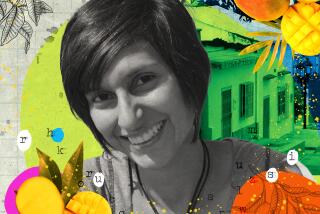Time to Communicate
- Share via
When I lived in Buenos Aires for a year after college, my Spanish was strictly for the books. I could muster the proper answer, if I could finagle the proper question.
You cannot imagine how rarely anyone on the Avenida Nueve de Julio cared what my great-grandfather, the Judge, thought about the law east of the Pecos.
So there I was in those early weeks, tongue-tied and verb-gnarled, as I tried to compliment my landlady on the dinner vegetables--the green things whose name I could not remember in Spanish.
She was kind and patient and knew no English.
“Speak like a child,” she urged. “Don’t stop to search for a perfect word or tense . . . just talk. It will come easier that way. Children aren’t embarrassed when they start to speak.”
Words That Work
Thus, I rammed on with such eloquent translations as “Me want the green things more please,” and, bless her, the fresh spinach would be passed my way.
I think of this often in travels. The relaxed and happy people who set out to communicate, with or without language, reap the most pleasure from a trip. James Michener, who has lived in many lands while researching his novels, does not claim to know foreign languages, nor does he claim that it has slowed him down. He says that in Afghanistan or the Aleutians or the compounds of Bali, he simply sits and listens and talks.
Reaching out with a question or a gesture can open tent flaps or shop doors. Friendly curiosity can bring precious moments that do not rank on any monumental scale of importance, except for the joy of recollection.
I shall never forget a visit this autumn to the Goteborg Maritime Museum in Sweden. The director, a scholarly sort of immaculate bearing, stood on marble steps in the entrance hall to welcome our group.
After mentioning the nautical relics in the collection, he added that the museum is home to a Mississippi alligator that was born in 1922, a gift from the United States. She is one of the oldest alligators in captivity, he claimed, and will make the Guinness Book of Records if she hangs on until 1988.
A Natural Question
Naturally, that grabbed my attention.
“What is her name?” I called, lifting my tape recorder.
“It is long, so I will spell it slowly for you,” he replied. “O--with two dots over it,” he began, pursing and rolling his lips. “ERR--AH--N--S--S--N--D--S--T--ERR--OO--UM.”
“Which means?” asked the fellow to my right.
“Oran Sundstrom,” he said. “It is my name.”
I grinned, but did not laugh.
“And the alligator’s name?” I repeated.
“Oh, she is Smilet,” he said. Later, in the museum basement, I met Smilet; she gave me a slow, bored wink.
Another language lesson took place in Glasgow. A traditional dinner menu at the Albany Hotel promised: “Yer Ain Wee Chieftain O’th Puddin Race, Champit Tatties, Bashed Neeps.”
Tatties are potatoes, neeps are turnips, and both were mashed and tasty.
“Your Own Small Chieftain of the Pudding Race,” I learned, is haggis, a solid Scottish favorite with a hearty flavor--hearty, and livery, and. . . .
I looked up the recipe and wished I had not. The words were hard to stomach.
More to Read
Sign up for our Book Club newsletter
Get the latest news, events and more from the Los Angeles Times Book Club, and help us get L.A. reading and talking.
You may occasionally receive promotional content from the Los Angeles Times.







